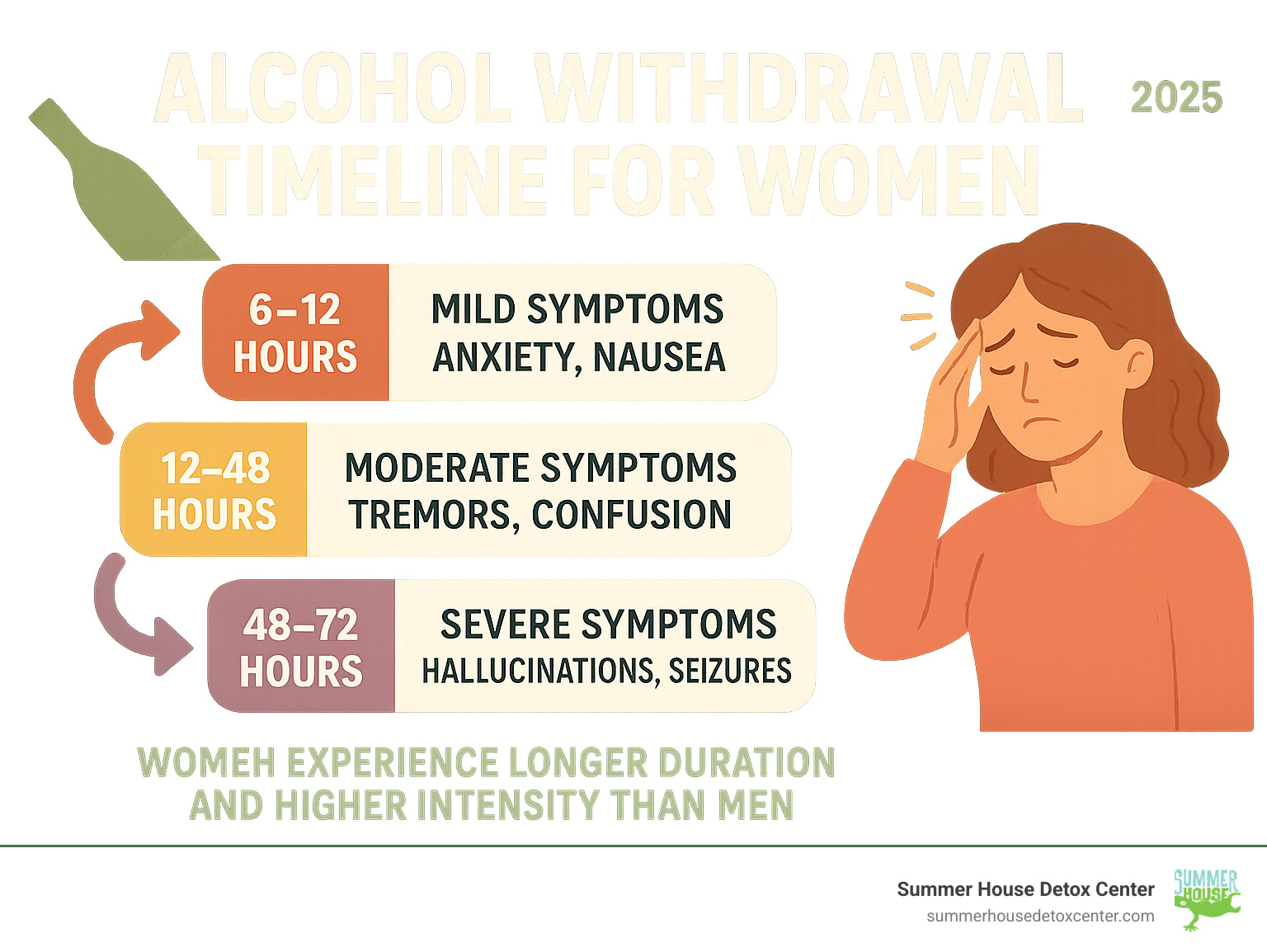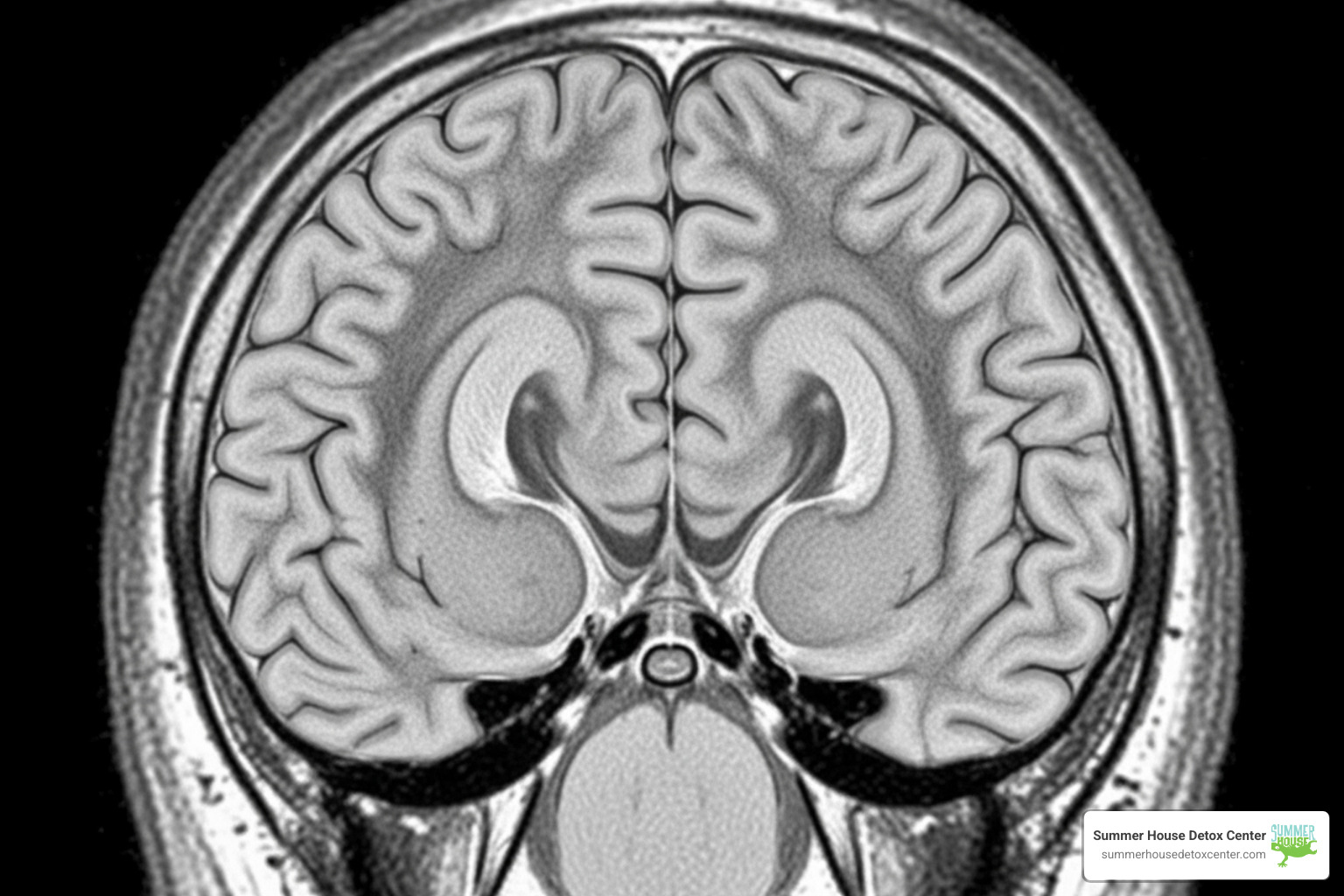Why Women Need Specialized Alcohol Detox Care
Alcohol detox for women requires specialized care that addresses the unique biological, psychological, and social factors that make women’s withdrawal experience different from men’s. Women develop alcohol problems more quickly, experience more intense physical withdrawal symptoms, and face higher risks of complications like delirium tremens (DTs).
Key factors that make women’s alcohol detox different:
- Faster progression: Women develop alcohol dependence more quickly than men
- More intense symptoms: Higher rates of tremors, nausea, sweating, and headaches
- Longer timeline: Withdrawal symptoms often last longer and are more severe
- Higher medical risks: Increased likelihood of seizures and life-threatening complications
- Mental health factors: Greater rates of co-occurring depression, anxiety, and trauma
- Social barriers: Stigma and shame that prevent women from seeking help
Whether you’re a professional, senior, or veteran, finding the right detox program in Florida means understanding these unique challenges.
Research shows that women are more likely to seek treatment when they find it – but they often face barriers like fear of judgment, concerns about childcare, or worries about losing their job. The good news? Women-focused detox programs create safer spaces where you can heal without these added stressors.
At Summer House Detox Center in Miami, we understand that your journey to sobriety isn’t just about clearing alcohol from your system. It’s about addressing the whole person – your fears about withdrawal, your past attempts at getting sober, and your hope for a fresh start.

Quick alcohol detox for women definitions:
Why a Woman’s Experience with Alcohol Withdrawal is Different
When we talk about alcohol addiction and withdrawal, it’s crucial to recognize that men and women often have very different experiences. These differences aren’t just social; they’re deeply rooted in biology, physiology, and the societal pressures women face. Women tend to develop alcohol problems more quickly than men, even with a shorter period of heavy drinking. This phenomenon is sometimes called the “telescoping effect.” This means that women can become reliant on alcohol much faster, accelerating their path to addiction.

Biologically, women’s bodies process alcohol differently. Women typically have smaller bodies, weigh less, and have less body water than men. This means that for the same amount of alcohol consumed, women will generally have a higher blood alcohol concentration (BAC). Hormonal fluctuations, particularly those related to the menstrual cycle, pregnancy, and menopause, can also influence how alcohol affects a woman and her vulnerability to addiction and withdrawal symptoms.
This faster progression also comes with a higher risk of organ damage. Women are more susceptible to alcohol-related liver disease (like cirrhosis), heart muscle damage (cardiomyopathy), and brain damage, even with lower levels of alcohol consumption over shorter periods compared to men.
Beyond the physical, women often experience higher rates of co-occurring mental health disorders alongside their alcohol use disorder. Alcoholism in women is frequently linked to underlying mental health issues such as depression or anxiety. An estimated 9.5 million adults in the United States have a mental condition in addition to a substance use disorder. This means that for many women, treating the alcohol addiction also requires addressing conditions like:
- Depression
- Anxiety
- Eating Disorders
- Post-Traumatic Stress Disorder (PTSD)
The interplay between alcohol and these conditions can complicate the detox process and require integrated treatment methods for successful, long-term recovery.
Finally, social stigma plays a significant role. Social stigma surrounding alcoholism affects women differently than it does men. Oftentimes, this leads to feelings of guilt or shame that can increase the intensity of their drinking problem and make it harder for them to seek help for their addiction. The fear of being judged, losing custody of children, or facing professional repercussions can create immense pressure, leading many women to hide their drinking, which further isolates them and exacerbates the problem.
The Unique Physical and Psychological Symptoms
When a woman decides to stop drinking, the withdrawal symptoms she experiences can be particularly challenging. Women experience more physical withdrawal symptoms like tremors, sweats, nausea, and headaches during alcohol withdrawal than men do when abstaining from alcohol. These symptoms can be more intense and distressing, requiring careful medical management.
The alcohol withdrawal timeline for women is often longer and more intense than that of men. While general timelines exist, women may find their symptoms persist for a greater duration, requiring more sustained medical support. For example, while acute withdrawal often peaks around 48-72 hours, lingering physical discomfort and psychological distress can extend for days or even weeks.
One of the most severe and potentially life-threatening complications of alcohol withdrawal is Delirium Tremens (DTs). DTs is characterized by severe confusion, rapid heartbeat, sweating, trembling, and vivid hallucinations or seizures. Women may be more at risk for alcohol withdrawal and delirium tremens than men. This heightened risk underscores the critical need for professional medical supervision during detox.
Psychologically, beyond the physical discomfort, women often report heightened anxiety, significant mood swings, and intense cravings. These psychological symptoms can be overwhelming and contribute to relapse if not properly managed. The emotional toll of withdrawal can be profound, making a supportive and understanding environment essential for successful detox.
The Dangers of Detoxing at Home
Given the unique challenges and heightened risks women face during alcohol withdrawal, attempting to detox at home can be incredibly dangerous, even life-threatening. We strongly advise against unsupervised detox, especially for those with significant alcohol dependence.
Here’s a comparison of attempting detox at home versus undergoing medically supervised detox:
| Feature | At-Home Detox | Medically Supervised Detox (Summer House Detox Center) |
|---|---|---|
| Medical Supervision | None | 24/7 monitoring by medical professionals |
| Symptom Management | Rely on self-care, often ineffective | Medications administered to alleviate symptoms |
| Seizure Risk | High, unmanaged | Reduced with medication, immediate intervention available |
| Delirium Tremens (DTs) | High risk, potentially fatal without intervention | Managed with medication, emergency care on standby |
| Hydration/Nutrition | Often neglected, leading to dehydration/malnutrition | Monitored and supported with IV fluids and proper nutrition |
| Emergency Care | None, delayed response in crisis | Immediate access to medical care and emergency protocols |
| Relapse Potential | Very high due to discomfort and lack of support | Lowered by comfortable environment and professional support |
| Mental Health Support | None, can exacerbate crises | Integrated psychological support and crisis intervention |
| Comfort & Dignity | Extremely uncomfortable, isolating | Focus on comfort, dignity, and a supportive environment |

Without professional oversight, the unpredictable nature of withdrawal symptoms poses a severe threat. Symptoms can escalate rapidly from mild discomfort to severe complications like seizures or DTs. Severe alcohol withdrawal can be fatal. Trying to manage this alone means there’s no one to intervene if a medical emergency arises. Dehydration is a common issue during withdrawal, and without proper fluid and electrolyte management, it can lead to serious health problems. The lack of medical support means no access to medications that can ease discomfort, prevent seizures, or manage blood pressure and heart rate fluctuations.
Furthermore, attempting detox at home can lead to intense mental health crises. The anxiety, depression, and mood swings are often overwhelming without professional psychological support. This greatly increases the potential for immediate relapse, as individuals may return to alcohol simply to escape the agonizing withdrawal symptoms.
At Summer House Detox Center, our priority is your safety and comfort. We provide the expertise and environment necessary to steer withdrawal effectively, ensuring you have the best possible start to your recovery journey.
The Medically Supervised Detox Process at Summer House Detox Center
At Summer House Detox Center, we believe that the first step to lasting recovery is a safe, comfortable, and medically supervised detox. Our approach to alcohol detox for women is designed to address your unique needs, ensuring that your journey begins with the utmost care and professionalism.
Upon arrival, your detox journey begins with a comprehensive medical assessment. Our experienced medical team, including doctors and nurses, will evaluate your physical and mental health, review your medical history, and understand the severity and duration of your alcohol dependence. This assessment is crucial for developing a personalized treatment plan custom specifically to you.
Throughout your stay, you’ll benefit from 24/7 monitoring. Our compassionate staff, some of whom are in recovery themselves, are always on hand to observe your progress, manage any emerging symptoms, and provide immediate support. This constant oversight is vital, especially during the critical initial phases of withdrawal, to ensure your safety and comfort.
Symptom management is a cornerstone of our detox process. We use medication-assisted treatment (MAT) to alleviate the often-unpleasant and sometimes dangerous symptoms of alcohol withdrawal. Benzodiazepines are commonly used to help mitigate severe withdrawal symptoms, reduce the risk of seizures, and promote relaxation. Our medical team carefully administers these medications to ensure optimal comfort and safety.
Beyond medication, we focus on holistic support, including nutritional support. Proper nutrition and hydration are essential during detox to help your body heal and regain strength. We ensure you receive balanced meals and necessary fluids to support your recovery. Our goal is to create a safe, supportive, and dignified environment where you can focus entirely on healing, knowing you are in capable and caring hands.
Stages of Alcohol Withdrawal for Women
Understanding the stages of alcohol withdrawal can help you prepare for what to expect during detox. While individual experiences vary, particularly for women who may experience symptoms more and for longer durations, the general progression often follows these phases:
- Stage 1 (6-12 hours after last drink): This initial phase often brings mild to moderate symptoms. You might experience anxiety, insomnia, nausea and vomiting, stomach issues, tremors (shakiness), and excessive sweating. Headaches are also common.
- Stage 2 (12-48 hours after last drink): As withdrawal progresses, symptoms can intensify. This stage may include increased blood pressure, a rapid heart rate, confusion, and more pronounced tremors. Mood swings, heightened agitation, and even panic attacks can occur.
- Stage 3 (48-72 hours after last drink): This is the most severe stage, where the risk of serious complications is highest. Symptoms can include hallucinations (visual, auditory, or tactile), high fever, severe disorientation, and seizures. This is also the period when Delirium Tremens (DTs) is most likely to occur, which, as we’ve noted, women may be at higher risk for. While physical symptoms usually decrease within 5-7 days, psychological symptoms can persist.
These timelines are averages. For women, the duration and intensity can be prolonged, making professional medical supervision non-negotiable for a safe detox.
Post-Acute Withdrawal Syndrome (PAWS)
Detoxification is just the first step. After the acute withdrawal symptoms subside, some individuals, including many women, may experience what’s known as Post-Acute Withdrawal Syndrome (PAWS). This is a set of protracted withdrawal symptoms that can linger for weeks or even months after the initial detox period.
PAWS symptoms are primarily psychological and emotional, though they can manifest physically. Common symptoms include:
- Persistent mood swings
- Low energy and fatigue
- Difficulty sleeping (insomnia or disturbed sleep)
- Anxiety and depression
- Irritability
- Difficulty concentrating or “brain fog”
- Increased cravings
These symptoms can be frustrating and challenging, making it feel like recovery is an uphill battle long after the alcohol has left your system. The presence of PAWS highlights the critical importance of ongoing support and continued treatment beyond detox. Without addressing these lingering issues, the risk of relapse remains high. At Summer House Detox Center, we emphasize that detox is the foundation, not the entire building. We prepare you for the next steps in your recovery journey, understanding that sustained support is key to navigating PAWS and building a strong, sober future.
Specialized Alcohol Detox for Women: Finding Your Program in Florida
Finding the right detox program can feel overwhelming when you’re already struggling with so much. But here’s what we’ve learned from years of helping women in Miami and throughout Florida: the environment where you heal matters just as much as the medical care you receive.

Women-only and women-focused programs create something special that you might not find elsewhere: safe spaces where you can be completely honest about your experiences. When you’re sitting in a room with other women who understand the unique pressures you face – whether it’s juggling career demands, managing family responsibilities, or dealing with past trauma – there’s an immediate sense of connection.
In these settings, you’ll find peer support that goes deeper than surface-level encouragement. Other women share stories that might mirror your own, creating bonds that often extend well beyond treatment. Without the distractions that can come with co-ed environments, you can focus entirely on your healing journey.
What makes these programs particularly powerful for alcohol detox for women is their emphasis on trauma-informed care. Many women struggling with alcohol dependence have experienced some form of trauma, whether it’s childhood abuse, domestic violence, or sexual assault. Women-focused programs understand this connection and create treatment approaches that address both the addiction and the underlying trauma that may have contributed to it.
This approach recognizes that healing isn’t just about stopping drinking – it’s about addressing the underlying issues that led to alcohol use in the first place. When you feel safe and understood, you’re more likely to open up about these difficult experiences, which is often the key to lasting recovery.
Unique Needs in Alcohol Detox for Women Who Are Professionals
If you’re reading this during a lunch break or after a long day at the office, you’re not alone. Many professional women struggle with what’s called high-functioning alcoholism – maintaining successful careers while privately battling alcohol dependence.
The stigma in the workplace around addiction can feel crushing. You might worry about colleagues finding your struggle, fear losing professional credibility, or panic about the career impact of taking time for treatment. These aren’t unreasonable concerns – they’re real challenges that require understanding and discretion.
Professional women often use alcohol to cope with stress and burnout from demanding careers. The pressure to perform, long hours, and constant decision-making can create a perfect storm where alcohol becomes a way to “turn off” at the end of the day. Before you know it, that glass of wine has become several, and what started as stress relief has become dependence.
At Summer House Detox Center in Miami, we understand your need for discretion. Our private, medically supervised environment protects your confidentiality while providing the comprehensive care you need. We work with you to develop healthy coping mechanisms for work-related stress, so you can return to your career with renewed strength and better tools for managing pressure.
Many of our professional clients appreciate that they can focus on healing without worrying about their privacy being compromised. Recovery doesn’t mean the end of your career – it often means the beginning of a more authentic and sustainable way of working.
Key Considerations for Senior Alcohol Detox for Women
If you’re a woman over 65 considering alcohol detox, your journey requires special attention to the unique ways aging affects both alcohol dependence and recovery. Your body processes alcohol differently now than it did in your younger years, and withdrawal can present additional challenges.
Age-related health risks become more significant during detox. Conditions like heart disease, diabetes, or osteoporosis can be complicated by alcohol withdrawal symptoms. Your slower metabolism means alcohol stays in your system longer, potentially making withdrawal symptoms more intense or prolonged.
Medication interactions are a critical concern for senior women. If you’re taking medications for blood pressure, heart conditions, diabetes, or other health issues, these can interact dangerously with both alcohol and withdrawal medications. This is why professional medical supervision isn’t just recommended – it’s essential.
The increased fall risk during withdrawal is particularly serious for older adults. Dizziness, confusion, or tremors can lead to dangerous falls that might result in broken bones or head injuries. Many senior women also have co-existing medical conditions that need careful monitoring throughout the detox process.
At Summer House Detox Center, our comprehensive medical oversight ensures that all your health conditions are managed during detox. Our team understands the complex medical needs of senior women and provides specialized care that prioritizes your overall well-being alongside your recovery from alcohol dependence.
Addressing Trauma in Detox for Female Veterans
Female veterans carry unique burdens that often contribute to alcohol dependence. If you’re a female veteran struggling with drinking, you’re dealing with challenges that most civilians can’t fully understand.
High rates of PTSD among female veterans stem from both combat exposure and, tragically, Military Sexual Trauma (MST). Studies show that MST strongly correlates with substance use disorders in female veterans. The betrayal of trust and safety within military environments can create lasting wounds that many women try to numb with alcohol.
Coping with combat exposure and the transition back to civilian life creates additional stress. The hypervigilance, sleep disturbances, and emotional numbness that often follow military service can make alcohol seem like the only way to find peace or feel something again.
For female veterans, dual diagnosis treatment is crucial. Your alcohol dependence likely exists alongside PTSD, depression, anxiety, or other mental health conditions. Treating one without addressing the other rarely leads to lasting recovery.
Building trust is particularly important for female veterans, as past traumas may make you wary of seeking help or opening up to treatment providers. You need culturally competent care from people who understand military culture and the specific experiences of women in service.
Florida offers numerous veteran support resources that we can connect you with during and after detox. At Summer House Detox Center, our compassionate staff understand the sensitive nature of treating female veterans and provide the integrated care needed to address both addiction and trauma, creating a foundation for lasting healing.
Life After Detox: Building a Foundation for Recovery in Florida
Completing detox is an incredible achievement, but it’s really just the beginning of your recovery story. Think of alcohol detox for women as clearing the foundation – now it’s time to build something beautiful and lasting on that solid ground.
At Summer House Detox Center, we know that detox alone doesn’t address the deeper reasons why you started drinking in the first place. That’s why we work closely with you to create a seamless transition into the next phase of your journey. Whether you’re ready for residential treatment, an intensive outpatient program (IOP), or a partial hospitalization program (PHP), we help you find the right fit for your life and circumstances.
These continuing care programs offer the therapy and support you need to develop real, lasting coping skills. Individual counseling gives you a safe space to work one-on-one with a therapist, exploring your personal triggers and any past traumas that may have contributed to your drinking. It’s your time to dig deep and develop strategies that work specifically for you.
Group therapy becomes a powerful source of strength and connection. There’s something incredibly healing about sitting with other women who truly understand what you’ve been through. You’ll share experiences, gain support from peers, and learn from others’ journeys in a structured, safe environment. Many women find these connections become lifelong friendships.
Family therapy can help heal the relationships that addiction may have strained. It’s not always easy, but rebuilding trust and improving communication with your loved ones creates a supportive home environment that strengthens your recovery.
Support groups and social connections are vital for maintaining your sobriety long-term. Organizations like Alcoholics Anonymous (AA) and Women for Sobriety (WFS) provide peer-led support that offers ongoing encouragement and accountability. Building sober social circles might feel challenging at first, but it’s one of the most important investments you can make in your new life.
Accessing Support and Resources in the Miami Area
Living in South Florida gives you access to an incredible network of recovery resources, and we’re here to help you steer them all. Miami’s recovery community is vibrant and welcoming, with support systems designed specifically for women at every stage of their journey.
We can connect you with holistic therapies that complement your recovery beautifully. Yoga helps you reconnect with your body in a positive way while reducing stress and building mindfulness. Miami’s year-round beautiful weather makes it perfect for outdoor yoga sessions that feel more like self-care than treatment.
Meditation practices help you develop the inner peace and emotional regulation that become essential tools for handling life’s challenges without alcohol. Whether you prefer guided meditation or mindfulness practices, we can help you find local teachers and groups that resonate with you.
Nutritional counseling addresses the physical healing your body needs after alcohol use. Many women are surprised to learn how much better they feel when their nutrition is properly balanced. South Florida’s abundance of fresh, healthy foods makes this journey both delicious and healing.
Our team maintains strong connections with community resources throughout Miami and the greater South Florida area. We can help you find local AA meetings, specialized women’s support groups, and other recovery services that fit your schedule and preferences.
We believe in empowering you with not just the tools for recovery, but the connections that make South Florida feel like home in your new sober life. From Miami Beach to Coral Gables to Aventura, there’s a community waiting to welcome and support you as you build this new chapter.
Conclusion
Your journey to recovery is uniquely yours, and understanding that alcohol detox for women requires specialized care is the first step toward healing. Throughout this guide, we’ve explored how women face distinct challenges – from developing alcohol dependence more quickly to experiencing more intense withdrawal symptoms and higher risks of serious complications like seizures and Delirium Tremens.
The path isn’t just about the physical aspects of withdrawal. Women often carry additional burdens: the guilt and shame from societal stigma, co-occurring mental health conditions like depression and anxiety, and the complex needs of professionals worried about their careers, seniors managing multiple health conditions, or veterans processing trauma from their service.
What we’ve learned is clear: attempting detox at home isn’t just uncomfortable – it can be dangerous, even life-threatening. The unpredictable nature of withdrawal, especially for women, requires the 24/7 medical supervision and immediate emergency care that only a professional facility can provide.
At Summer House Detox Center here in Miami, we see your courage every day. We know that reaching out for help takes incredible strength, especially when you’re facing fears about your career, your family, or simply the unknown. Our experienced staff – many who’ve walked this path themselves – understand that recovery isn’t just about clearing alcohol from your system. It’s about reclaiming your life with dignity and hope.
Recovery is absolutely possible. Every woman who walks through our doors carries her own story, her own struggles, and her own dreams for the future. Whether you’re a professional in downtown Miami, a senior in South Florida, or a veteran anywhere in the state, specialized care that honors your unique needs isn’t just available – it’s waiting for you.
The first step might feel overwhelming, but you don’t have to take it alone. Hope isn’t just something we talk about at Summer House Detox Center – it’s something we help you build, one day at a time.
Find compassionate, personalized care at our alcohol detox center.
